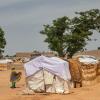
The SHAW Group’s research activities directly and comprehensively addresses the measurement of human wellbeing in its multiple dimensions with a special focus on health as a key component and social cohesion as a key determinant of wellbeing.
SHAW employs various demographic methods, statistical techniques, and empirical concepts to comprehensively assess different dimensions of good health and wellbeing, while also considering equity in the distribution of wellbeing over time and over the life course for different populations around the world. In doing so, the group aims to develop alternative indicators of wellbeing to effectively measure development progress. The aim is for such indicators of wellbeing to be applied as long-term sustainability criteria that can help to pinpoint vulnerable subgroups of populations for policy priorities. Due to the group’s strong focus on sustainable human wellbeing, particular attention is paid to the feedback of emerging situations such as pandemics, economic crises, and extreme weather events that can pose risks to human health and wellbeing.
Models, tools, datasets
Projects
Staff
News

25 February 2025
Master Programme "Global Demography" at the University of Vienna

18 November 2024
Health and Wellbeing Research at IIASA Workshop

11 March 2024
Training Workshop on Demographic Analysis with Applications to Aging and Health
Events
Vienna, Austria and online
Wittgenstein Centre Conference 2024-Delayed Reproduction: Challenges and Prospects
Focus
08 November 2023
Explaining the impacts of climate change on migration

07 September 2022
The migration maze

Publications
KC, A., Abbasi-Shavazi, M., Eigelaar-Meets, I., Lijadi, A.A., Reiter, C. , Striessnig, E. , & Lutz, W. (2025). Assessing sustainable wellbeing in Africa through “Years of Good Life”. Environmental Development 54 e101140. 10.1016/j.envdev.2025.101140. Umansky, K., Weber, D. , & Lutz, W. (2025). Revisiting the role of education in attitudes toward immigration in different contexts in Europe. Genus 81 (1) 10.1186/s41118-024-00238-9. Borghi, J., Cuevas, S., Anton, B., Iaia, D., Gasparri, G., Hanson, M., Soucat, A., Bustreo, F., & Langlois, E. (2024). Climate and health: a path to strategic co-financing? Health Policy and Planning 39 (Supple) i4-i18. 10.1093/heapol/czae044. Sanchez-Romero, M. & Fürnkranz-Prskawetz, A. (2024). Socio-Economic Consequences of Increased Longevity in Contemporary Populations. In: The Biodemography of Ageing and Longevity. Eds. Lemaître, J.-F. & Pavard, S., pp. 353-374 Cambridge University Press. ISBN 9781009007245 10.1017/9781009007245.019. Adhikari, S., Lutz, W. , & Kebede, E. (2024). Forecasting Africa’s fertility decline by female education groups. Proceedings of the National Academy of Sciences 121 (46) e2320247121. 10.1073/pnas.2320247121.









